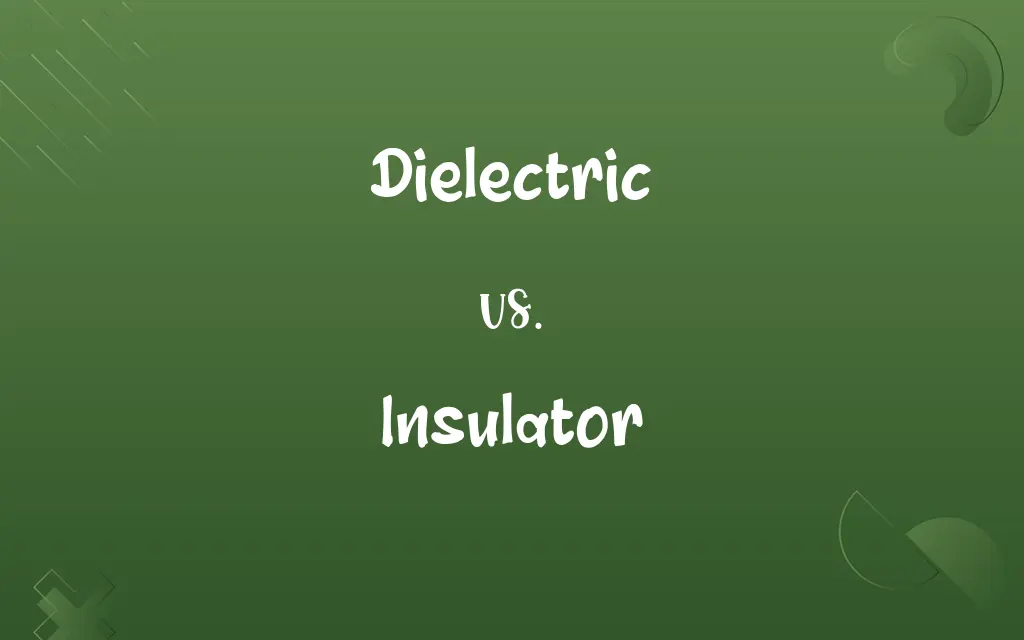Dielectric vs. Insulator: Know the Difference

By Shumaila Saeed || Updated on February 20, 2024
Dielectrics are materials that insulate and can be polarized by an electric field, while insulators resist electric current without polarization.

Key Differences
Dielectrics are materials that don't conduct electricity but can be polarized when subjected to an electric field. This polarization property is crucial in capacitors. Insulators, however, are materials that resist the flow of electric current. While both dielectrics and insulators do not conduct electricity, the key difference lies in the dielectrics' ability to support an electric field through polarization.
Shumaila Saeed
Feb 18, 2024
In electrical applications, dielectrics are used specifically for their ability to store electrical energy. This is utilized in capacitors where the dielectric material separates charged plates, enabling energy storage. Insulators are used more broadly to prevent the flow of electricity, ensuring safety and functionality in electrical systems by protecting wires and components.
Shumaila Saeed
Feb 18, 2024
The polarization of dielectrics is a unique property where the material becomes polarized in response to an electric field, aligning its internal electric dipoles. This does not occur in insulators, which simply resist electric current and do not exhibit internal electric dipole alignment under an electric field.
Shumaila Saeed
Feb 18, 2024
Common dielectric materials include ceramics, glass, and certain polymers, chosen for their specific dielectric properties like high dielectric constant and low dielectric loss. Insulators, on the other hand, include materials like rubber, plastic, and wood, chosen primarily for their high resistance to electrical conductivity.
Shumaila Saeed
Feb 18, 2024
Dielectrics are essential in the design of electronic components like capacitors, where their ability to store and release electrical energy is exploited. Insulators are used more generally in electronic devices to protect users and sensitive components from electric currents, ensuring safe operation.
Shumaila Saeed
Feb 18, 2024
ADVERTISEMENT
Comparison Chart
Electrical Conductivity
Does not conduct electricity
Does not conduct electricity
Shumaila Saeed
Feb 18, 2024
Main Use
Used in capacitors for energy storage
Used to prevent the flow of electricity
Shumaila Saeed
Feb 18, 2024
Electrical Characteristic
Characterized by dielectric constant
Characterized by electrical resistance
Shumaila Saeed
Feb 18, 2024
ADVERTISEMENT
Energy Storage
Supports electric fields for energy storage
Does not store electrical energy
Shumaila Saeed
Feb 18, 2024
Dielectric and Insulator Definitions
Dielectric
Dielectric materials are essential in capacitors for their energy storage capability.
The high dielectric constant of certain polymers makes them ideal for advanced capacitors.
Shumaila Saeed
Jan 17, 2024
Insulator
Insulators are crucial for the safety and functionality of electrical devices.
Insulators around copper wires prevent short circuits in electronic devices.
Shumaila Saeed
Jan 17, 2024
Dielectric
Dielectrics are non-conductive materials with an ability to support electrostatic fields.
Glass, a common dielectric, is used in many electronic components for insulation.
Shumaila Saeed
Jan 17, 2024
Insulator
Insulators are used in electrical systems to prevent unwanted current flow.
Plastic insulators are integral to keeping household electrical appliances safe.
Shumaila Saeed
Jan 17, 2024
ADVERTISEMENT
Dielectric
Dielectrics exhibit polarization, aligning internal dipoles under electric fields.
In a dielectric material, the electric field causes an alignment of molecular dipoles.
Shumaila Saeed
Jan 17, 2024
Insulator
An insulator is a material that resists the flow of electric current.
Rubber, used as an insulator, provides safety in electrical wiring.
Shumaila Saeed
Jan 17, 2024
Dielectric
A dielectric is a material that insulates and can be polarized by an electric field.
The ceramic dielectric in the capacitor helps store and release electrical energy.
Shumaila Saeed
Jan 17, 2024
Insulator
Insulators have high electrical resistance and do not conduct electricity.
The wooden poles act as insulators, supporting power lines without conducting electricity.
Shumaila Saeed
Jan 17, 2024
Dielectric
Dielectrics are characterized by their dielectric constant and loss properties.
Engineers choose dielectrics with low dielectric loss for high-frequency circuit applications.
Shumaila Saeed
Jan 17, 2024
Insulator
Insulators include materials like rubber, glass, and plastic with high resistivity.
Glass insulators are often seen on power transmission towers for their high resistance.
Shumaila Saeed
Jan 17, 2024
Dielectric
A nonconductor of electricity, especially a substance with electrical conductivity of less than a millionth (10-6) of a siemens.
Shumaila Saeed
Jan 17, 2024
Insulator
A material that insulates, especially a nonconductor of sound, heat, or electricity.
Shumaila Saeed
Jan 17, 2024
Dielectric
(metamaterial) An electrically insulating or nonconducting material considered for its electric susceptibility, i.e. its property of polarization when exposed to an external electric field.
Shumaila Saeed
Jan 17, 2024
Insulator
A substance that does not transmit heat (thermal insulator), sound (acoustic insulator) or electricity (electrical insulator).
Shumaila Saeed
Jan 17, 2024
Dielectric
Any substance or medium that transmits the electric force by a process different from conduction, as in the phenomena of induction; a nonconductor, separating a body electrified by induction, from the electrifying body.
Shumaila Saeed
Jan 17, 2024
Insulator
A non-conductive structure, coating or device that does not transmit sound, heat or electricity (see image)
To isolate electrical wires from the pylons supporting them, one often uses glass insulators.
Shumaila Saeed
Jan 17, 2024
Dielectric
A material such as glass or porcelain with negligible electrical or thermal conductivity
Shumaila Saeed
Jan 17, 2024
Insulator
A substance or object that insulates; a nonconductor; as, polyurethane foam is a popular thermal insulator.
Shumaila Saeed
Jan 17, 2024
Insulator
A material such as glass or porcelain with negligible electrical or thermal conductivity
Shumaila Saeed
Jan 17, 2024
Repeatedly Asked Queries
Can dielectrics conduct electricity?
No, dielectrics do not conduct electricity under normal conditions.
Shumaila Saeed
Feb 18, 2024
What is dielectric constant?
The dielectric constant is a measure of how well a material can store electrical energy in an electric field.
Shumaila Saeed
Feb 18, 2024
What are some common dielectric materials?
Common dielectrics include ceramics, glass, and some polymers.
Shumaila Saeed
Feb 18, 2024
What defines a dielectric material?
Dielectrics are insulating materials that can be polarized by an electric field.
Shumaila Saeed
Feb 18, 2024
Can dielectrics store energy?
Yes, dielectrics can store and release electrical energy, particularly in capacitors.
Shumaila Saeed
Feb 18, 2024
What is the role of insulators in electronic devices?
Insulators protect the device's components and users from electric currents.
Shumaila Saeed
Feb 18, 2024
Are all insulators dielectrics?
While all dielectrics are insulators, not all insulators are dielectrics due to the lack of polarization.
Shumaila Saeed
Feb 18, 2024
What are typical uses of insulators?
Insulators are used in electrical cables, components, and systems for safety and functionality.
Shumaila Saeed
Feb 18, 2024
What is the primary function of an insulator?
Insulators primarily prevent the flow of electric current.
Shumaila Saeed
Feb 18, 2024
Why are insulators important in electrical wiring?
Insulators protect against electrical shocks and prevent short circuits in wiring.
Shumaila Saeed
Feb 18, 2024
What happens when a dielectric is placed in an electric field?
The dielectric material becomes polarized, aligning its dipoles with the field.
Shumaila Saeed
Feb 18, 2024
Are plastics good insulators?
Yes, many plastics are excellent insulators due to their high resistance to electrical current.
Shumaila Saeed
Feb 18, 2024
Why is rubber used as an insulator?
Rubber is used for its high electrical resistance and flexibility.
Shumaila Saeed
Feb 18, 2024
Can the dielectric constant vary with temperature?
Yes, the dielectric constant of materials can change with temperature.
Shumaila Saeed
Feb 18, 2024
Is wood a good insulator?
Wood is a decent insulator but not commonly used in high-voltage applications.
Shumaila Saeed
Feb 18, 2024
Can the thickness of a dielectric affect its performance?
Yes, the thickness of a dielectric can influence its insulating ability and capacity to store electrical energy.
Shumaila Saeed
Feb 18, 2024
How does polarization in dielectrics work?
In dielectrics, an applied electric field aligns the internal electric dipoles, leading to polarization.
Shumaila Saeed
Feb 18, 2024
What is a dielectric breakdown?
Dielectric breakdown occurs when a material loses its insulating properties under excessive electric field strength.
Shumaila Saeed
Feb 18, 2024
Are glass and ceramics both insulators and dielectrics?
Yes, glass and ceramics are both good insulators and have dielectric properties.
Shumaila Saeed
Feb 18, 2024
Do dielectrics have a limit to their insulating ability?
Dielectrics can break down under high voltages, losing their insulating properties.
Shumaila Saeed
Feb 18, 2024
Share this page
Link for your blog / website
HTML
Link to share via messenger
About Author
Written by
Shumaila SaeedShumaila Saeed, an expert content creator with 6 years of experience, specializes in distilling complex topics into easily digestible comparisons, shining a light on the nuances that both inform and educate readers with clarity and accuracy.









































































